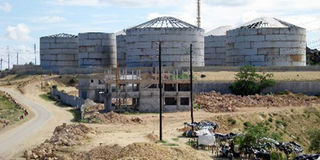No end to Triton saga one year on

Reports suggest Kenya Pipeline Company (KPC), which was responsible for holding the lost oil on behalf of the industry at its Kipevu Oil Storage Facility (KOSF), is headed for another major shock in an arbitration ruling between it and Kobil. Photo/FILE
A year after Triton Petroleum shocked Kenya through disappearance of fuel worth nearly Sh8 billion, the Yagnesh Devani empire in Kenya seems headed for the annals of history.
The would-be priest turned dodgy businessman is still in exile — reportedly either in India or the UK — and theoretically a fugitive from justice in Kenya. His portrait and profile on the Interpol web site, last refreshed on December 2, 2009, proclaims that he is wanted for theft here, but whether there is any political will in Kenya to get him is debatable.
In the meantime, reports suggest Kenya Pipeline Company (KPC), which was responsible for holding the lost oil on behalf of the industry at its Kipevu Oil Storage Facility (KOSF), is headed for another major shock in an arbitration ruling between it and Kobil.
The case, though somehow unrelated, revolves around management of ullage (storage space) at KOSF, Mombasa, where Triton was for years claimed to be a beneficiary of skewed allocation. Besides the dilemma over who pays for any shortfall from sale of Triton assets, the state-owned KPC may be forced to fork out billions to settle, according to impeccable sources who cannot be revealed due to the sensitivity of the case.
KPC and KCB Group managers were amongst the main losers after oil held for Triton clients vanished mysteriously, with the former losing almost the entire top management. The ministry of Energy was virtually unscathed despite its bureaucratic and political responsibility.
Last week, in the continuing unravelling of the Devani empire, a major building opposite Safaricom House in Westlands, Nairobi, was advertised for sale. This was part of the outcome of myriad court cases revolving around Devani and the Triton group.
But in the latest turn, National Oil Corporation of Kenya (Nock) and the ministry of Planning have lost the bid for Triton storage facility to a Swiss oil trader, Vitol. Both the State and Nock viewed the bulk diesel storage tanks in Mombasa as crucial in stabilising fuel supply and improving Nock’s market grip in Kenya but lost to a lower bidder.
Reuters news agency on Thursday reported the firm had won the bid for the 65,000 tonne storage which is critical in control of the down and mid-stream oil markets in Kenya and the region.
Nock, with the aid of the ministry, has been keen to grab distribution units from other players. During the exit of BP, it wrenched 15 per cent of the outlets from the buyer, Shell, and repeated the controversial act on French transnational Total after it took over the assets of the last American operator in the Kenyan market, Chevron.
The Mombasa facility was on sale through a court order by lawyers of Kenya Commercial Bank (KCB), Fortis Bank of Netherlands and PTA Bank and belongs to Triton Bulk Storage Company Ltd, a subsidiary of Triton. The banks financed the ill-fated oil.
According to industry players, lawyers of KCB, Fortis Bank and PTA Bank received a bid of $9.4 million (Sh705 million) from Nock for the deteriorating facility located at Kipevu. Vitol quoted $9.3 million (Sh697.5 million) but its bid and conditions appeared more acceptable to the sellers.
Sources said Vitol had expressed discomfort with some conditions relating to guarantee of transfer and ownership of the facility that Nock demanded, a view apparently shared by the auctioneers.
Interestingly, neither this sale nor that of the Westlands structure, which is 70 per cent complete, will dent the claims against the controversial oil trade totalling nearly Sh8 billion. Who foots the balance is still an issue no one in government appears keen to hog publicity about.
KCB, Fortis Bank and PTA Bank are the secured creditors of Triton. Last week, Hydrocarbons Management Consultants said the sale by private treaty had to be concluded swiftly because construction work of the terminal has to resume to avoid cost overruns.
“The initial cost of building the terminal would escalate if construction work does not resume. The value of the tanks is depreciating yet Kenya needs extra storage space for fuel,” said its lead consultant, Robert Shisoka.
After Triton was put under receivership in December 2008, construction stopped as contractors exited before the mounting of top covers leading to rain water filling the bottoms of the tanks. It was projected the terminal’s construction work for the first phase was to be completed by July 2009 at a cost of $25 million for Triton and its clients.
Among bidders
Nock says the tanks are strategic in helping reducing risks of supply fuel disruption. Gulf Energy, KenolKobil, National Petroleum Distributors Sacco, Mocoh Africa and Puma were among the bidders. But only Vitol, Nock, Gulf Energy and Puma were allowed to go to the negotiation stage while the others were knocked out on technical grounds, including failing to deposit one per cent of the bid value.
Vitol, in early 2009, sent technical experts to access the terminal while Nock sent its engineers to access the facility and submit a report to the management with the view to seek funds from the government in March 2009. Devani held other properties, including land, countrywide where attention of creditors is likely to turn after the Nairobi and Mombasa establishments are gone.
But, if the 45-year-old Mombasa-born businessman ever faces justice, who pays for the mess is an issue that will preoccupy the public and creditors alike in 2010. KPC, with all the major infrastructure projects lined up, should be paying keen attention as well.




